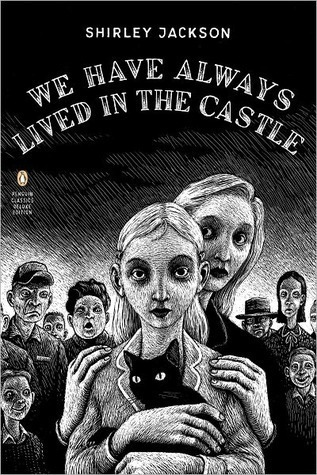
Spoilers ahead . . . you have been warned. 5/5 Goodreads stars.
It’s hard to know exactly where to begin, with this book. After having read Jackson’s Hillhouse, last year, I came across this one during my shelving duties at the Hurst Public Library, where I work part time. For one thing, I’m not exactly sure where I would classify this book, genre-wise. Is it “horror?” Not exactly, although it has elements of horror. Is it a “ghost story?” To be perfectly honest, I’m not one hundred percent certain. I don’t think it is, but there were moments, during reading, that I wondered.
It definitely has elements of a scary story, though, and acts like a ghost story, much of the time.
Constance and Mary Katherine (Merricat, and I absolutely adore that nickname) are sisters and live together in a large house with their Uncle Julian. They are the last three members of the immediate family. It appears that everyone else in the family died from poisoning a number of years earlier. Constance was accused and tried for the murder, but not convicted. Merricat has a cat named Jonas.
The people of the nearby village, in general, don’t like the Blackwood family (that’s Constance, Merricat, and Uncle Julian). Merricat goes to town a couple days a week, to buy supplies for them, and is not normally treated very well.
One day, out of the blue, cousin Charles shows up. I’m never quite sure of the reason, or his intent, but I suspect he is after money. You see, Constance and Merricat keep all of their money hidden away in the house, most of it in a safe in their late father’s study. In addition, we eventually discover that Merricat, who likes to bury things, has buried numerous silver dollars around the property. This, of course, upsets cousin Charles to no end.
Merricat seems to fancy herself a witch of some sort, as she speaks of days when she has the most power, and also has words that she employs, that she believes protect them and the house. In addition, she is constantly wishing people dead, sometimes in horrific fashion. It must be noted, though, that these wishes are not entirely unwarranted, as the family does experience a bit of persecution, as previously alluded to.
One source of this persecution can be seen in a cruel and taunting rhyme, employed by the villagers.
“Merricat, said Connie, would you like a cup of tea?
Oh, no, said Merricat, you’ll poison me.
Merricat, said Connie, would you like to go to sleep?
Down in the boneyard ten feet deep!”
Merricat’s response: “Their tongues will burn, I thought, as though they had eaten fire. Their throats will burn when the words come out, and in their bellies will feel a torment hotter than a thousand fires.”
Okay. Maybe this is a horror story.
My favorite line in the book occurs on the first day that Charles offers to go into town to get supplies. It is Tuesday, and that’s Merricat’s day to do this.
“Since Charles had taken my occupation for Tuesday morning I had nothing to do. I wondered about going down to the creek, but I had no reason to suppose that the creek would even be there, since I never visited it on Tuesday mornings.”
Shades of Shrodinger’s Cat! “If a tree falls in the forest, and there is no one there to hear it . . .” and so on.
Slightly beyond the halfway point, the story takes a tragic turn. Because of Charles’s constant pipe smoking, the house catches fire and the upper portion burns away completely. By this point, Merricat has been conspiring on ways to get Charles to leave, but with no success. Did she have something to do with the fire?
Nevertheless, the village’s firemen arrive and begin to put out the fire. The rest of the village also arrives, to watch. Things get out of hand. Some of the villagers opine that they should just let the house burn, along with Constance and Merricat. They begin trashing what is left of the house, when the fire is put out. Furniture is destroyed; Constance’s harp (I believe it was also their mother’s) was knocked over and broken; food was destroyed. And, to make matters worse, during all of this turmoil, Uncle Julian dies.
Constance and Merricat carry on, afterward, essentially shutting themselves up in the house, and will see no one, whatsoever. People come to the door, begging them to answer, but they will not. Eventually, people feel guilty for their behavior and begin leaving food at the front door, along with notes, “Sorry about the harp,” and so on.
It’s a tragic tale, I believe, about human nature and how we tend to hate things we do not know or understand. The element of ruthless greed is involved, as well, so excellently depicted in Cousin Charles, who does show up one more time, in a shameless attempt to get the money.
Honestly, I enjoyed this story quite a bit more than Hillhouse. I especially grew fond of Merricat’s cat, Jonas.
TTFN, y’all!